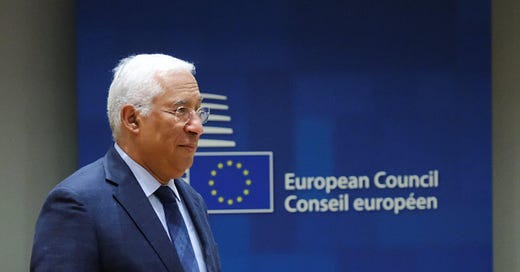António Costa gets green light for top job
EU leaders nominated former PM António Costa to become next President of the European Council. But it's not a done deal just yet.
It's official. European leaders have appointed former portuguese PM António Costa to the post of President of the European Council, succeeding Belgian Charles Michel, who has been in the post since 2019.
He is the first Socialist to chair the European Council, which until now has always been occupied by conservatives and one liberal.
The name of the former prime minister may have been the easiest to reach a consensus among the 27, but the unknown remained until the end of the meeting, which lasted into the night and over dinner, with the leaders leaving the decision on the top posts until the end of the meeting. Earlier, the discussion turned to defence funding and the Middle East. All the names on the table were given the green light.
Ursula von der Leyen is to serve a second term in the European Commission and the Prime Minister of Estonia, Kaja Kallas, becomes the main figure to lead the Union's diplomacy. The summit of European leaders ends today in Brussels.
In practice, the former prime minister's mandate will run for an initial period of two and a half years, which may or may not be renewed. Leyen and Kallas will serve five-year terms.
Italian Prime Minister Giorgia Meloni was one of the white elephants in the room, as she was unhappy to be marginalised by her European Council colleagues in the discussions on the distribution of top posts.
Not a done deal yet
However, Ursula Von der Leyen still faces a knife-edge vote in the European Parliament, which even her own party allies admit will be more of a challenge to pull off.
Von der Leyen needs a majority of 361 votes in Strasbourg - one more than half the total of 720 MEPs in the chamber - but this support must come in a secret ballot – the biggest challenge to assessing support since it makes lawmakers less accountable, eroding party discipline.
“According to Berlaymont estimates, von der Leyen needs 40 to 50 additional votes because, at the moment, her teams count on a majority of 399 MEPs but they expect 15% of ‘mavericks’ [lawmakers voting differently from their parties],” the diplomat continued.
If she fails to pass in the Parliament, she cannot stand again for the post, meaning that EU leaders will have to find a replacement for President of the European Commission. And this, in turn, could also shift the power calculations behind the secret, unwriten rules of the EU’s top jobs carve-up, which in turn could mean EU leaders might want to change their picks for the other top jobs.
That vote could come as soon as July 18.




